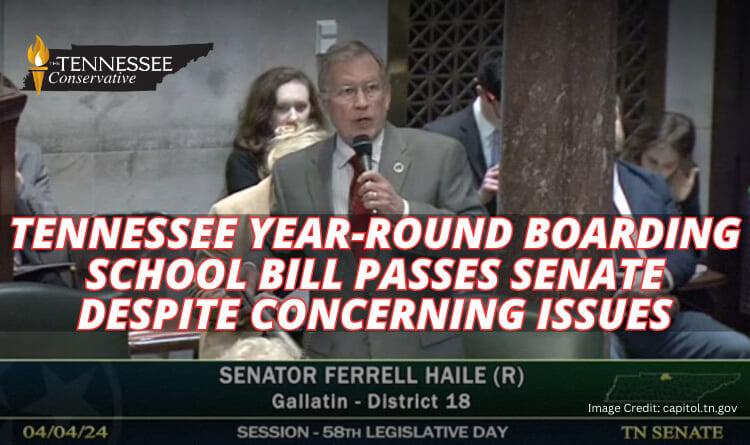Image Credit: capitol.tn.gov
The Tennessee Conservative [By Paula Gomes] –
Proposed legislation that would allow year-round boarding schools to be created in Tennessee for “at risk” youth passed in the Senate yesterday despite concerning issues with the bill.
Senate Bill 2820 (SB2820) sponsored by Senator Ferrell Haile (R-Gallatin-District 18) was amended to exclude the enrollment of students in state care in an “opportunity public charter school” that runs a residential program unless the student was already attending the school before being placed in DCS custody.
The proposed law gained the support of nineteen Senators who voted aye compared to seven who voted no. The Tennessee General Assembly website has the votes recorded as follows:
Senators voting aye were: Bailey, Crowe, Gardenhire, Haile, Jackson, Johnson, Lowe, Lundberg, Massey, Niceley, Powers, Reeves, Stevens, Swann, Taylor, Watson, White, Yager, Mr. Speaker McNally — 19.
Senators voting no were: Bowling, Briggs, Campbell, Hensley, Oliver, Pody, Yarbro — 7.
Senators present and not voting were: Roberts — 1
Republican Senators Janice Bowling (R-Tullahoma-District 16), Richard Briggs (R-Knoxville-District 7), and Joey Hensley (R-Hohenwald-District 28) had concerns about the bill before the vote was taken.
Briggs, who asked how the residential side of the schools would be funded, received an answer from Haile that he doubted such schools would ever be created but that it was possible if the right non-profit had the “heart” to make it happen.
Briggs brought up a troubling issue, previously questioned in the House, about the co-mingling of very different student populations that the bill defines as eligible for the “opportunity schools.” Students who are juvenile delinquents, with drug abuse problems, pregnant, victims of abuse, and possibly developmentally disabled could all be accepted at a potential year-round residential school with students from 12 to 21 years of age in attendance.
Although Haile said that this type of charter school could turn down applications and so avoid the co-mingling of cohorts of students with very different and specific needs, there is nothing in the bill’s language that states that this is possible. Section 9 states “an opportunity public charter school must enroll an at-risk student who submits a timely application, unless the number of applications exceeds the capacity of a program, class, grade level, or building.”
Jasmine Miller, Staff Attorney with the Youth Law Center told The Tennessee Conservative, “I’m not sure that the rulemaking process can fix this, because the rules can’t conflict with the statute.”
Haile also gave the impression that students with disabilities could be refused when Hensley asked if the charter schools would be required to take disabled students. Despite the fact that the charters would be a kind of public school and public schools are not allowed by law to discriminate against students with disabilities, Haile said the schools would be able to decide who they accept.
Miller told us, “We would anticipate that the population of youth that they are drawing from would be very heavily youth with disabilities. Monument Academy, which is one of the handful of existing residential charter schools, and seemingly the only one focused specifically on “at-risk” youth, has about half youth with disabilities according to their budget documents.”
Although the choice to have a student attend such a school is meant to be parental choice, Bowling brought up some potential logistical issues regarding juvenile courts that might order youth to attend a residential charter school as part of their sentence. If this was the case, the facility would perhaps face having to enforce the Prison Rape Elimination Act.
The issue of not requiring parent participation on the governing board of these schools, brought up in the House, has also not been addressed further.
One difference in the amendments that make the bill in both chambers will have to be addressed household income required for eligibility. The House version of the bill sets eligibility for families with income that is below four hundred percent (400%) of the federal poverty level, whereas in the Senate, the threshold is two hundred percent (200%).
The bill is to be heard in the House Finance, Ways & Means Subcommittee on April 10th, 2024.
About the Author: Paula Gomes is a Tennessee resident and reporter for The Tennessee Conservative. You can reach Paula at paula@tennesseeconservativenews.com.












